
The Battle of Adwa was the climactic battle of the First Italo-Ethiopian War. Ethiopia managed to defeat the invading Italian force led by Oreste Baratieri on Sunday, March 1, 1896, near the town of Adwa. The decisive victory thwarted the campaign of the Kingdom of Italy to expand its colonial empire in the Horn of Africa. By the end of the 19th century, European powers had carved up almost all of Africa after the Berlin Conference; only Ethiopia and Liberia still maintained their independence. Adwa became a pre-eminent symbol of pan-Africanism and secured Ethiopian sovereignty until the Second Italo-Ethiopian War forty years later.

The 19th Infantry Division "Venezia" was a infantry division of the Royal Italian Army during World War II. The Venezia was classified as a mountain infantry division, which meant that the division's artillery was moved by pack mules instead of the horse-drawn carriages of line infantry divisions. Italy's real mountain warfare divisions were the six alpine divisions manned by Alpini mountain troops. The division was named for the city of Venice and based in Tuscany, from where it also recruited most of its troops. After the Armistice of Cassibile between the Allies and Italy was announced on 8 September 1943 the division joined the Yugoslav partisans in Montenegro and formed the Partisan Division "Garibaldi".

Giuseppe Galliano was an officer of the Royal Italian Army, mostly known for his role during the First Italo-Ethiopian War. He perished in the Battle of Adwa and was posthumously awarded the Gold Medal of Military Valour.

Giuseppe Edoardo Arimondi, OSML, OMS, OCI was an Italian general, mostly known for his role during the First Italo-Ethiopian War. He was one of the few European commanders who gained a victory over the Mahdists before Kitchener's Expedition, soundly defeating them at Agordat in 1893. After a long and successful colonial service, he died in combat at Adwa, and was posthumously awarded the Gold Medal of Military Valour.
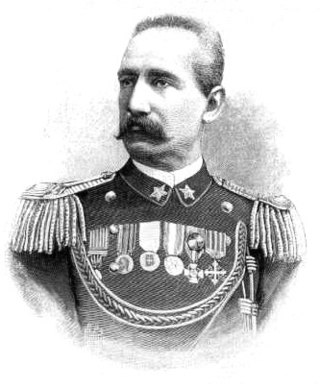
Matteo Francesco AlbertoneOCI was an Italian general, mostly known for his role during the First Italo-Ethiopian War. He led the Native Brigade during the battle of Adwa and was taken prisoner by the Ethiopians.
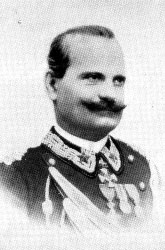
Vittorio Emanuele Dabormida, 2nd Count Dabormida, OSML, OCI was an Italian general and noble, mostly known for his role during the First Italo-Ethiopian War. He died in combat at Adwa, and was posthumously awarded the Gold Medal of Military Valor.

Enrico Frattini was an Italian general during World War II, most notable for commanding the 185th Paratroopers Division "Folgore" during the second battle of El Alamein, and the second commander of Allied Land Forces Southern Europe in the 1950s.
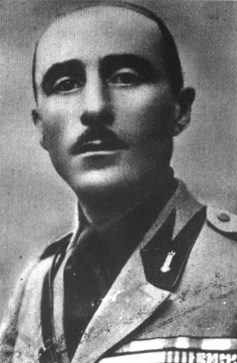
Enrico Francisci was an Italian Blackshirt general during World War II.

Gervasio Bitossi was an Italian general during World War II, pioneer of tank warfare in the Royal Italian Army and among Italy's main experts in the field of mechanized warfare.

Vito Artale was an Italian general during World War II.
Augusto Ugolini was an officer in the Royal Italian Army during World War II, best known for his leadership during the battle of Culqualber, for which he was awarded the Gold Medal of Military Valor.
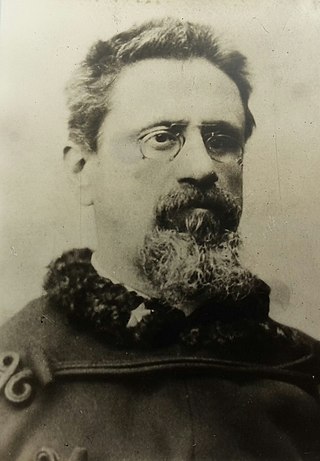
Cesare Airaghi (1840-1896) was an Italian colonel and war hero who participated in several conflicts during the 19th century. Airaghi participated in the Second Italian War of Independence, the Third Italian War of Independence and the First Italo-Ethiopian War before being killed at the Battle of Adwa.

Umberto Masotto (1864-1896) was an Italian Captain who served in the First Italo-Ethiopian War. He commanded the 4th Mountain Artillery Battery during the Battle of Adwa but was more famously known for being the first field gunner to receive the Gold Medal of Military Valour.

Trentino La Barba was an Italian soldier and Resistance fighter during World War II.

Francesco De Rosa (1853-1896) was an Italian major of the First Italo-Ethiopian War. He commanded the 1st Artillery Brigade during the Battle of Adwa and was a posthumous recipient of the Gold Medal of Military Valor for his brave service in the battle before being killed in action.

Leopoldo Cesare Prato was an Italian major of the First Italo-Ethiopian War. He commanded the 6th African Infantry Battalion during the Battle of Adwa before being killed in the battle. He was also a posthumous recipient of the Gold Medal of Military Valor for his service in the battle.

Giuseppe Antonio Baudoin was an Italian major of the Third Italian War of Independence and the First Italo-Ethiopian War. He commanded the 9th Africa Infantry Battalion during the Battle of Adwa before being killed in the battle. He was a posthumous recipient of the Gold Medal of Military Valour for his service in the battle.
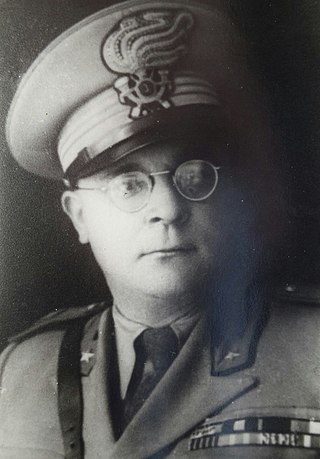
Aminto Caretto was an Italian Arditi and Bersaglieri officer, commander of the XXVI Arditi unit in World War I and of the 3rd Bersaglieri Regiment in World War II. He was mortally wounded on the Eastern Front during World War II and posthumously awarded the Gold Medal of Military Valor.

The 84th Infantry Regiment "Venezia" is an inactive unit of the Italian Army last based in Falconara Marittima. The regiment is named for the city of Venice and part of the Italian Army's infantry arm.
Alfonso Torelli was an Italian General who was killed in a battle against Libyan rebels.


















